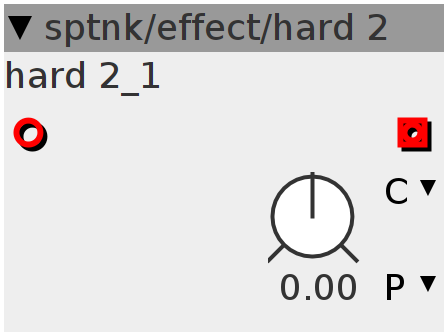hard 2
Pseudo-tanh (hyperbolic tangent) waveshaper distortion. It can go from soft to hard clipping. Powerful enough signals can leak over. Antialiased.
Inlets
frac32buffer Input
Outlets
frac32buffer Output, not saturated to normal range. You should attenuate it!
Parameters
frac32.s.map gain
Declaration
/*
*
* int32_t fast_log2( float number )
{
return (( * ( int32_t * ) &number ) >> 23)-127 ; ///log2
approximation, vaguely based on the fast inverse square root algo (see it on
wikipedia! it's A W E S O M E )
}
float fast_log2_f( float number ) //a little more precise than the
previous one.. But still not precise enough
{
int32_t i = ( * ( int32_t * ) &number );
float fractional = logt[(i & 0x7FFFFF)>>15]/16384.f;
float integer = ( i >> 23)-127 ;
return (fractional + integer);
}*/
float log2_f(float number) {
int32_t i = (*(int32_t *)&number);
int32_t t_i = (i & 0x7FFFFF) >> 15;
int32_t t_ii = t_i + 1;
int32_t y1 = logt[t_i];
int32_t y2 = t_ii <= 0xFF
? logt[t_ii]
: 16384; // i worked my ass hard to get this number.. Like
int32_t percent = (i & 0x7FFF) << 15;
float fractional = ((float)___SMMLA(percent, y2 - y1 << 2, y1)) / 16384.f;
float integer =
(i >> 23) -
127; // log2 approximation, vaguely based on the fast inverse square root
// algo (see it on wikipedia! it's A W E S O M E )
return (fractional + integer);
}
// remember you can change base of a logarithm. In this case ln(x) =
// log2(x)/log2(e) = log2(x)/1.4426 = log2(x)*0.6931 the hyperbolic tangent is
// approximated as x*(27 + x^2)/(27 + 9x^2) - it's a cheap approximation.
// therefore it sounds good! the integral of our approximation is equal to
// 1/18(x^2 + 24ln(x^2+3) ) * * * * (see where i need the logarithm?)
typedef struct {
float x_old = 0;
float Y_old = 0;
float gain = 0;
} waveshaper_state;
float waveshaper_update(float input, waveshaper_state *wss) {
float x = (wss->gain) * input; // x
float x2 = x * x; // x^2
float y = x * (27 + x2) / (27 + 9 * x2);
float Y = 0.05555f * (x2 + 16.6344f * log2_f(x2 + 3.f));
float dY = Y - (wss->Y_old);
float dx = x - (wss->x_old);
float dx_abs = dx > 0 ? dx : -dx;
float mean = dY / dx;
(wss->x_old) = x;
(wss->Y_old) = Y;
return dx_abs > 0.01f ? mean : y;
}
void waveshaper_gain(int32_t param, waveshaper_state *wss) {
(wss->gain) = 1.0f + ((float)(param > 0 ? param << 4 : param)) / 134217728.0f;
}
waveshaper_state satu;
float out_old = 0;
Control Rate
waveshaper_gain(param_gain, &satu);
Audio Rate
outlet_out =
134217728.0f * waveshaper_update((((float)inlet_in)) / 134217728.0f, &satu);